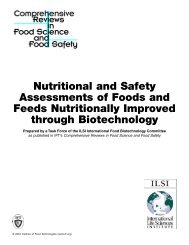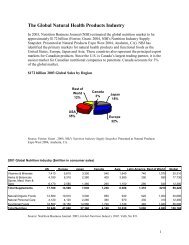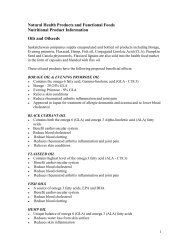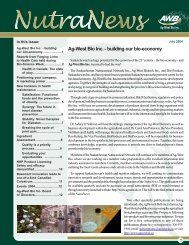Beyond Borders: Global biotechnology report 2010
Beyond Borders: Global biotechnology report 2010
Beyond Borders: Global biotechnology report 2010
Create successful ePaper yourself
Turn your PDF publications into a flip-book with our unique Google optimized e-Paper software.
Malaysia year in review<br />
A strategic focus on biotech<br />
Malaysia’s budding <strong>biotechnology</strong> industry<br />
has been a key strategic focus for the<br />
nation’s policy-makers and business<br />
community in recent years. Like many<br />
emerging markets, its strategy has often<br />
hinged on leveraging areas of competitive<br />
advantage, such as its extraordinarily rich<br />
biodiversity. These strategic investments<br />
continued in 2009.<br />
Government investment<br />
The Malaysian Government has allocated<br />
RM 2 billion (US$571.4 million) under the<br />
Ninth Malaysian Plan (2006–10) to fund<br />
the development of the industry. Between<br />
the launch of the National Biotechnology<br />
Policy (NBP) in 2005 and late 2009, the<br />
Government estimates that the industry<br />
has received cumulative investments of<br />
RM 4.5 billion (US$1.3 billion), of which<br />
58% came from the Government and the<br />
remainder from the private sector. The<br />
industry continues to attract strategic<br />
investments, with the Government<br />
allocating RM 1.3 billion (US$371.1<br />
million) for <strong>biotechnology</strong> development<br />
under the First and Second Stimulus<br />
Packages in 2008 and 2009.<br />
Malaysian Biotechnology Corporation<br />
(BiotechCorp, the lead agency responsible<br />
for implementing the NBP) estimates<br />
that the number of biotech companies<br />
has increased threefold since 2005, with<br />
41% of existing companies involved in<br />
agricultural <strong>biotechnology</strong> (reflecting<br />
the country’s traditional strengths in<br />
agriculture), followed by 38% in medical<br />
<strong>biotechnology</strong> and the remaining 21% in<br />
industrial <strong>biotechnology</strong>.<br />
Sustainable funding<br />
It is no secret that bringing <strong>biotechnology</strong><br />
products to market is a long, expensive<br />
and high-risk process. In the West, there<br />
has traditionally been a thriving ecosystem<br />
of investors that provide multiple rounds<br />
of funding as companies move along the<br />
<strong>biotechnology</strong> industry value chain. In<br />
Malaysia, however, existing private funds for<br />
<strong>biotechnology</strong> are inadequate to meet the<br />
developmental goals set out in the NBP.<br />
While there are approximately 38 VCs<br />
that identify <strong>biotechnology</strong> as one of<br />
their focus investment areas, only two<br />
firms — SpringHill BioVentures and First<br />
Floor Capital — have invested actively in<br />
biotech companies. In total, the VCs have<br />
invested close to RM 251 million (US$71.7<br />
million) in life sciences during the last<br />
three years (2006–08), but life sciences<br />
50 <strong>Beyond</strong> borders <strong>Global</strong> <strong>biotechnology</strong> <strong>report</strong> <strong>2010</strong><br />
investments as a share of investment<br />
across all industries declined from 24% in<br />
2006 to 18% in 2008. Furthermore, only<br />
31% (US$22.6 million or RM 79 million) of<br />
the investment between 2006 and 2008<br />
went to Malaysian companies. Attracting<br />
venture capital clearly remains a challenge<br />
for Malaysian biotech companies. And this<br />
is especially so when it comes to secondround<br />
funding for pre-commercialization<br />
and commercialization activities.<br />
The Government is attempting to increase<br />
investor confidence and attract greater<br />
private-funding participation. This includes<br />
continuing to allocate funds for soft loans<br />
and proposing a new venture fund that<br />
would aim to attract greater participation of<br />
foreign VCs specializing in <strong>biotechnology</strong>.<br />
Deals<br />
In late 2008 and early 2009, Malaysia’s<br />
Holista Biotech acquired CollTech Australia,<br />
a Perth-based company listed on the<br />
Australian Stock Exchange, through a<br />
reverse takeover. As part of the transaction,<br />
CollTech issued 770 million shares to<br />
Holista, giving Holista shareholders about<br />
70% of the voting rights in CollTech and<br />
making Holista a subsidiary of CollTech. The<br />
two companies have strong synergies on the<br />
product front — CollTech specializes in ovine<br />
collagen products, and Holista focuses on<br />
natural products such as collagen.<br />
BiotechCorp spearheaded the acquisition<br />
of four platform technologies with the<br />
intention of boosting innovation: two<br />
platform technologies acquired for health<br />
care, the nanotechnology platform from<br />
Nanobiotix and the DotScan antibody<br />
microarray diagnostic platform technology<br />
from Medsaic; the Marker Assisted Selection








